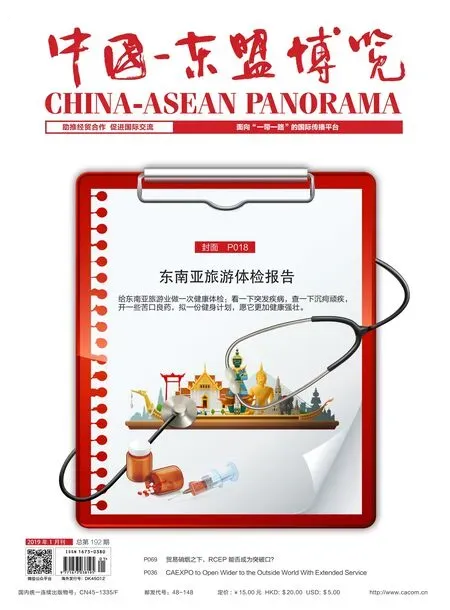兩面針:打造大健康產業生態圈讓民族品牌走向世界
□ 文/本刊記者 朱英華
“一口好牙,兩面針”。這句廣告語很多消費者都不陌生。作為中國知名的民族品牌,兩面針承載著20世紀80~90年代中國人的時代記憶。但是很多人不知道,如今的兩面針已是一款風靡東南亞的牙膏,在馬來西亞、泰國、柬埔寨等東南亞國家都有它的身影,兩面針中藥牙膏品質獲得了東南亞地區用戶的好評。
兩面針的“前世今生”
對于柳州兩面針股份有限公司(以下簡稱“兩面針”)的“前世今生”,兩面針副總裁吳堃介紹,兩面針的發展歷程大致可以分為三個階段。第一階段,從立產品到立品牌。兩面針起源于1941年成立的亞洲枧廠等5家小型私營肥皂廠。1978年組建“柳州市牙膏廠”,同年,率先成功研制出中國國內第一支中藥牙膏。得益于中國人對傳統中華醫藥的認同與信賴,兩面針中藥牙膏迅速占領了中國牙膏市場的大部分份額,連續多年在中國國內同類產品中產銷量第一。這個階段,兩面針完成了立產品。兩面針第一支中藥牙膏上市之后,市場覆蓋率達到了25%,即4個牙膏消費者中就有一名兩面針牙膏的顧客。市場認可帶動了兩面針產品的地位,1992年,兩面針進行商標注冊,完成了從立產品到立品牌的過程。第二階段,從樹品牌到樹公司。品牌成功樹立后,1994年,兩面針完成股份制改造,成功完成由樹品牌到樹公司的階段。第三階段,從企業上市到中藥理念深度開發。兩面針改制為股份制公司后,2004年,成為行業首家以自己名字在上海證券交易所掛牌上市的公司。兩面針開始嘗試多元化經營戰略,從單一的牙膏產業擴大到洗滌、婦女用品等等,并向眾多進入中國市場的外資牙膏品牌學習管理經驗,在競爭中發展壯大。兩面針公司上市后,在揚州設立酒店用品有限公司,將中藥護理理念推向酒店用品領域。目前,兩面針酒店用牙膏在全國酒店用品中占據龍頭地位。此外,繼重組安徽芳草日化股份有限公司后,兩面針在2005年收購柳州制藥廠。至此,制藥業和中藥日化相結合,兩面針完成向大健康產業轉型的重要布局。
借東博會“東風”鋪就國際路

兩面針生產的中藥牙膏
2018年9月7日,中國—東盟博覽會戰略、行業、支持合作伙伴新聞發布會在南寧國際會展中心舉行,13家企業成為第15屆東博會戰略、行業、支持合作伙伴,其中就有兩面針。這是自2013年以來,該公司連續6屆與東博會建立合作。據了解,每年兩面針都為東博會制定出一套指定的洗護禮品裝,供東盟各國首腦住宿使用。得到國際首腦好評的兩面針被傳播到東盟地區,成為國際友人眼中的中國民族品牌。借助東博會的平臺,兩面針中藥日化產品走進新加坡、馬來西亞、緬甸、柬埔寨等東盟國家,成功開拓了海外市場。吳堃表示,對兩面針來說,東博會是一個重要的橋梁。通過東博會,兩面針成功地把產品和理念拓展到東南亞市場。目前,兩面針在東南亞市場廣泛開展品牌合作,實施產品代理,進行產業推廣升級。吳堃預計,2019年,兩面針將全部打通東盟10國市場(目前文萊、老撾、越南還沒建立合作),除了在各國設立經銷商,還計劃在緬甸、馬來西亞建廠,未來將深度開發東南亞地區市場。
兩面針的國際化戰略還體現在對產品的國際化升級上。2018年8月,兩面針牙膏在美國完成FDA檢測,成為中國第一支獲得美國合法銷售地位的功效型中藥牙膏,同時也是目前中國國內唯一獲得此地位的牙膏品牌,實現了從東南亞到美國的銷售版圖升級。
“通過東博會這個平臺,我們在東盟市場上尋找到更多戰略合作伙伴,同時通過積極‘走出去’,把中藥健康理念向全球推廣,為將兩面針打造成世界品牌、百年老店打下良好的基礎。”吳堃說。
挑戰下的“二次創業”
有機遇必然有挑戰。在發展的歷程中,兩面針也面臨著許多困難和挑戰。從1996年開始,外資品牌利用強大的營銷攻勢開始快速占領中國市場,中國牙膏市場格局也被重新洗牌。此外,2007年以后,隨著兩面針從“相關多元化”轉型到“非相關多元化”發展戰略后,兩面針日化產品出現銷量下滑的局面。2017年末,兩面針董事長林鉆煌提出“聚焦主業,效益先行”的聚焦發展戰略,重新確立日化和藥業為公司主業,將藥業作為支撐日化發展的基石,實現藥業與日化的深度融合,發展中藥理念下的健康產業。這被視為兩面針回歸的標志。如今的兩面針,聚集核心資源與核心業務,對品牌進行全新的定位升級,在產品功效定位上聚焦于“中藥修護”,這迎合了大健康環境下消費者對天然、健康的口腔產品的需求。
吳堃表示,兩面針致力于成為中藥理念下的大健康產業技術創新領先型企業,目前國際市場布局也面臨一些挑戰:其一,兩面針所選擇的國際化布局時機不算早,外資品牌早已布局海外各國,且影響力巨大;其二,國外文化和消費習慣不一樣,兩面針牙膏配方和包裝就必須兼顧當地情況;其三,如何能夠盡快地被當地人接受,需要摸索,找到合適的市場推廣手段,每個國家都有不一樣的國情。
對于未來的策略,吳堃說:“在布局方面,兩面針將開展細致的工作,一個國家一個對策;在文化相融問題上,盡量找到當地的合作伙伴,借鑒別人開發當地市場成熟的經驗和在國內行之有效的辦法,向同行學習,積極創新。在此基礎上我們力求在二次創業上走出一條全新的路子。”
從1978年研發出中國第一支中藥牙膏至今41年,兩面針經歷了連續15年本土銷量第一的輝煌,經歷了作為民族品牌驕傲的榮光,也經歷了市場業績下滑的低谷。然而,追求天然、健康一直是印刻在這個品牌骨子里的信仰,他們41年一直恪守純正中藥、純正組方,拒絕西藥添加,確保中藥牙膏品質。相信在未來,這個老牌民族企業一定能在“一帶一路”的國際化合作共贏中,走出一條創新與成功的新路子。
·聯系編輯:247620280@qq.com
Join ASEAN in Push for RCEP by Next Year,Singaporean PM Lee Tells Indian PM Modi
By Bhagyashree Garekar

Singaporean Prime Minister Lee Hsien Loong with Indian Prime Minister Narendra Modi at the ASEAN-India Summit on November 15, 2018
Prime Minister Lee Hsien Loong urged India to join ASEAN in a push to create the Regional Comprehensive Economic Partnership (RCEP), the world’s largest free trade area, next year.
“I am glad that we have made tremendous progress this year to advance the RCEP negotiations. We are now close to the finishing line, although further work remains to fi nalise the remaining details,” Mr. Lee said in remarks during the annual ASEAN-India Summit, attended by Prime Minister Narendra Modi.
The proposed pact between 16 nations, including the 10-member ASEAN grouping and its six free trade agreement partners Australia, New Zealand, Japan, China, South Korea and India, comprises 45% of the world’s population and a combined gross domestic product of about US$ 25 trillion (SGD 34.4 trillion), exceeding that of the United States.
The pact is seen as vital to securing the region’s continued prosperity, especially after a trade war broke out between its vital trading partners US and China.
Mr. Modi tweeted after the ASEAN-India meeting: “Cementing old bonds in pursuit of a glorious future. Had a great interaction with ASEAN leaders at the ASEAN-India Informal Breakfast Summit. We are happy that ties with ASEAN are strong and are contributing to a peaceful and prosperous planet.”
India has been somewhat hesitant in joining RCEP, unwilling to cut tariffs and open its market wider in the face of strong opposition from its farm sector as well as industries like steel and textiles.
The negotiations come at a sensitive time for Mr. Modi, who is seeking re-election next year.
New Delhi is especially guarded as the proposed pact includes China, India’s key trading partner as well as competitor.India has also wanted RCEP to include the service sector and improved access for its professionals.
Pointing to the trade potential that remains to be unlocked, Mr. Lee said: “We should make the full effort to bring the RCEP negotiations to conclusion in 2019. Together with the ASEAN-India Free Trade Area, we hope that this will help us reach the ASEAN-India trade target of US$ 200 billion in total trade by 2022.”
The ASEAN-India FTA was signed in 2010.Bilateral trade between ASEAN and India has grown to around US$ 80 billion, but seen as far short of its true potential. ASEAN nations are increasingly investing in India,including in ports, highways, townships and food processing, with the Modi government improving ease of doing business.
Mr. Lee also called for better maritime, air,land and digital connectivity between ASEAN and India, noting the progress made on the India-Myanmar-Thailand trilateral highway with an extension to Laos, Cambodia and Vietnam. “Enhancing air links will certainly strengthen businesses and people-to-people linkages and in order to help both Indian and ASEAN carriers tap new and emerging markets,” he added.
Mr. Modi had last met the ASEAN leaders in January at a commemorative summit in New Delhi to mark the 25thanniversary of ASEANIndia relations. They were his guests during India's Republic Day parade.
Under Mr. Modi’s Act East policy, India’s profile in South-east Asia has been on the rise. Mr. Lee noted that India has consistently supported ASEAN centrality, including in a speech made by Mr. Modi at the Shangri-La Dialogue in Singapore in June where he expanded on his vision for the Indo-Paci fi c at a time when the region feels competing pulls between the US and China.
“This period of geopolitical uncertainty gives new impetus for ASEAN and like-minded partners like India to deepen our cooperation,”Mr. Lee said. “ASEAN and India must continue to enhance our strategic partnership,”Mr. Lee said, noting that Singapore has always been a strong and consistent advocate for India's inclusion in the ASEAN community.
· Source: The Straits Times

